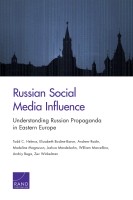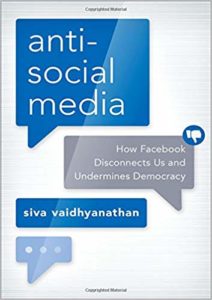
.
Surveillance, personalization, disinformation, moderation and microtargeting are just some of the ways in which social media threaten democratic processes, according to a new analysis. They also undermine democracy by distorting information, promoting false stories and facilitating political manipulation, says a new paper from the European Parliament’s Research Services (EPRS).
Whereas social media provide citizens with new opportunities to access information, express opinions and participate in democratic processes, they can also undermine democracy by distorting information, promoting false stories and facilitating political manipulation. Social media’s threats can be classified according to five aspects that generate risks – surveillance, personalization, disinformation, moderation, and microtargeting, the author, Costica Dumbrava, adds:
 Firstly, social media provide new and more effective ways to monitor people online, which can be used by governments to target politically active citizens and silence dissent(political surveillance). Even in the absence of explicit coercion, citizens who suspect they are the target of online surveillance may suppress their political expression online for fear of retribution. ….
Firstly, social media provide new and more effective ways to monitor people online, which can be used by governments to target politically active citizens and silence dissent(political surveillance). Even in the absence of explicit coercion, citizens who suspect they are the target of online surveillance may suppress their political expression online for fear of retribution. ….- Secondly, the promotion of personalized content on social media may lock citizens in informational bubbles, thus affecting their capacity to form opinions (narrowed worldviews). Whereas content personalization can help citizens deal with the problem of information overload, it can also limit the range of information available to them. …. It must be noted that evaluations of the political effects of social media may also depend on political (ideological) assumptions about the nature and conditions of democratic politics….
- Thirdly, the spread of false information on social media can undermine citizens’ capacity to form and express political views (distortion of political views and preferences). Despite growing evidence of people’s significant exposure to political disinformation online, the actual impact of disinformation on their views and preferences is difficult to assess….
 Fourthly, efforts by social media platforms to tackle disinformation and other forms of deception online may undermine users’ freedom of expression and enable control over public opinion (political censorship). Whereas all moderation measures are risky, content removal is particularly problematic when targeted content is not explicitly illegal. …
Fourthly, efforts by social media platforms to tackle disinformation and other forms of deception online may undermine users’ freedom of expression and enable control over public opinion (political censorship). Whereas all moderation measures are risky, content removal is particularly problematic when targeted content is not explicitly illegal. …- Fifthly, social media platforms rely on a variety of user data to profile people and sell targeted advertising (microtargeting). Whereas political microtargeting can serve to re-engage citizens in politics, it can also be used to manipulate citizens’ views and expectations (political manipulation). The covert or hidden nature of microtargeting increases the risk of manipulation and thus undercuts citizens’ capacity to form and make political choices….RTWT
If Biden’s Summit spurs cooperation among democracies to safeguard the internet and counter disinformation, it will have been worthwhile, says Robert A. Manning, a senior fellow of the Scowcroft Center for Strategy and Security and its New American Engagement Initiative at the Atlantic Council. But that won’t be easy. Nations have interests as well as values, and they are shaped by geography, economics, history and culture, he writes for The Hill:
The U.S. and European Union (EU) have very different philosophies about tech regulation and differing approaches to trade, resulting in large gaps. Indeed, even as the U.S.-E.U. summit created a U.S.-E.U. Trade and Technology Council to shape rules and standards, the United States admonished the EU for anti-U.S. tech regulations and digital tax proposals.
Aspects of social media’s impact on democracy are addressed by two newsletters from the National Endowment for Democracy‘s International Forum for Democratic Studies. “Digital Directions” focuses on authoritarian manipulation and democratic resilience within the digital domain and examines how illiberal actors are exploiting the information space and what democratic governments and civil society are doing to craft democratically accountable digital models.

“Pandemic Ploys” examines how authoritarians around the world have manipulated the COVID-19 pandemic to their advantage, focusing on the COVID-19 pandemic’s impact on democratic integrity, political crackdowns, democratic responses, emerging trends in technology, and related resources. Subscribe HERE.
The NED’s Center for International Media Assitance (CIMA) strives to build a foundation of knowledge for media development donors, implementers, and civil society actors on best practices and solutions for improving media systems.







